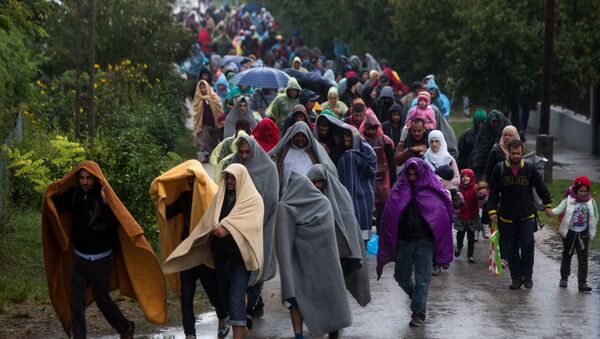On Wednesday, the EU Commission launched legal proceedings against the Czech Republic, Hungary and Poland for non-compliance with the EU's refugee quotas.
In September 2015, the EU Council forced through its plan to impose a quota system to redistribute 160,000 migrants from Greece and Italy across the EU by September 2017.
The plan was passed by the majority of EU interior ministers, but four of the bloc's members voted against the measure: Hungary, Slovakia, Romania and the Czech Republic. Finland abstained from the vote.
Since then, Hungary and Poland have not resettled a single refugee, while the Czech Republic initially accepted 12 people but has refused to take anyone else since August 2016.
The EU's move was predictable given its recent commitment to ensuring member states abide by their responsibilities, Aron Demeter, advocacy officer at Amnesty International Hungary, told Radio Sputnik.
"EU has recently shown a much more committed approach when it comes to applying sanctions against countries who are not complying with the legally binding rules. For example, the EU has launched many infringement procedures against Hungary in the last couple of years," Demeter said.
"Unfortunately, it seems that the countries which are under these sanctions usually don't comply with the infringement procedures. They do exchange letters and have a reasoned statement but actually these kinds of infringement procedures are not really meaningful when it comes to Hungary, for example."
Launching the infringement procedure is the first step in a process that could see the three countries fined by the EU's Court of Justice.
Hungary, Poland and the Czech Republic have received a "letter of formal notice" from the EU, which they have one month to reply to. If the Commission isn't satisfied with the reply, it may move to the next stage of the procedure and send its "reasoned opinion" to the member states.
"If after this stage nothing happens, meaning the countries are still not complying with the rules and the commitment, the whole thing goes to the Court of Justice of the European Union and its trial procedures, so it could take some time."
The EU's relocation scheme is just one of several measures which are necessary to tackle the migrant crisis, Demeter said.
"We have to understand that relocation is just one temporary step, it's not a sustainable solution. I think it could work but the countries need to take more steps and more actions if we want to deal with this global crisis in Europe. Namely, we have to establish legal and safe routes for people who are fleeing like resettlement, humanitarian visas and other ways."
The EU is responding to several serious challenges over the past two years, including the migrant crisis and Brexit, with an effort to strengthen its institutions and values.
"The EU has realized that if it doesn't make itself stronger and stick to the core values of the union, it will split. Now I'm quite optimistic because it seems that the EU is taking concrete steps to fulfil its mission, so I wouldn't say that this is an integrity crisis."
"It's definitely very hard when there are countries which are refusing to participate in the common solution. I think the EU is changing and will change in the near future. We truly hope that these countries, particularly Hungary, will stay in the EU and eventually it will comply with the common rules," Demeter concluded.




